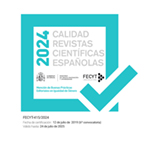Melissa Network a material and symbolic space where migrant and refugee women’s narratives become acts of emancipation
Abstract
The proposed article aims to describe and analyze the organizational process of Melissa network (MN) of migrant and refugee women in Greece, as well as the internal processes within the associations that are part of the network. Women come across as agents of change, as opposed to the hegemonic discourse often used by the humanitarian sector when talking about sexual and gender based violence which tends to portray them as victims and passive recipients of violence. Three basic processes are described: the individual processes of the newcomers, women who arrived to Greece in the last three years seeking asylum; the group/associative processes of those who have been in the host country for a while; and, finally, the network’s processes which support both newcomers and those who are in the process of organizing their own associations. Melissa network serves as an umbrella offering the structure and the bases to help to develop the community. Ultimately, it generates strategies of resistance and promotes direct actions, therefore women’s narratives convey their capacities and become acts of change and subversion.Downloads
Publication Facts
Reviewer profiles N/A
Author statements
- Academic society
- N/A
- Publisher
- Grupo de Investigación Cultura Digital y Movimientos Sociales. Cibersomosaguas
Article download
License
In order to support the global exchange of knowledge, the journal Teknokultura is allowing unrestricted access to its content as from its publication in this electronic edition, and as such it is an open-access journal. The originals published in this journal are the property of the Complutense University of Madrid and any reproduction thereof in full or in part must cite the source. All content is distributed under a Creative Commons Attribution 4.0 use and distribution licence (CC BY 4.0). This circumstance must be expressly stated in these terms where necessary. You can view the summary and the complete legal text of the licence.













